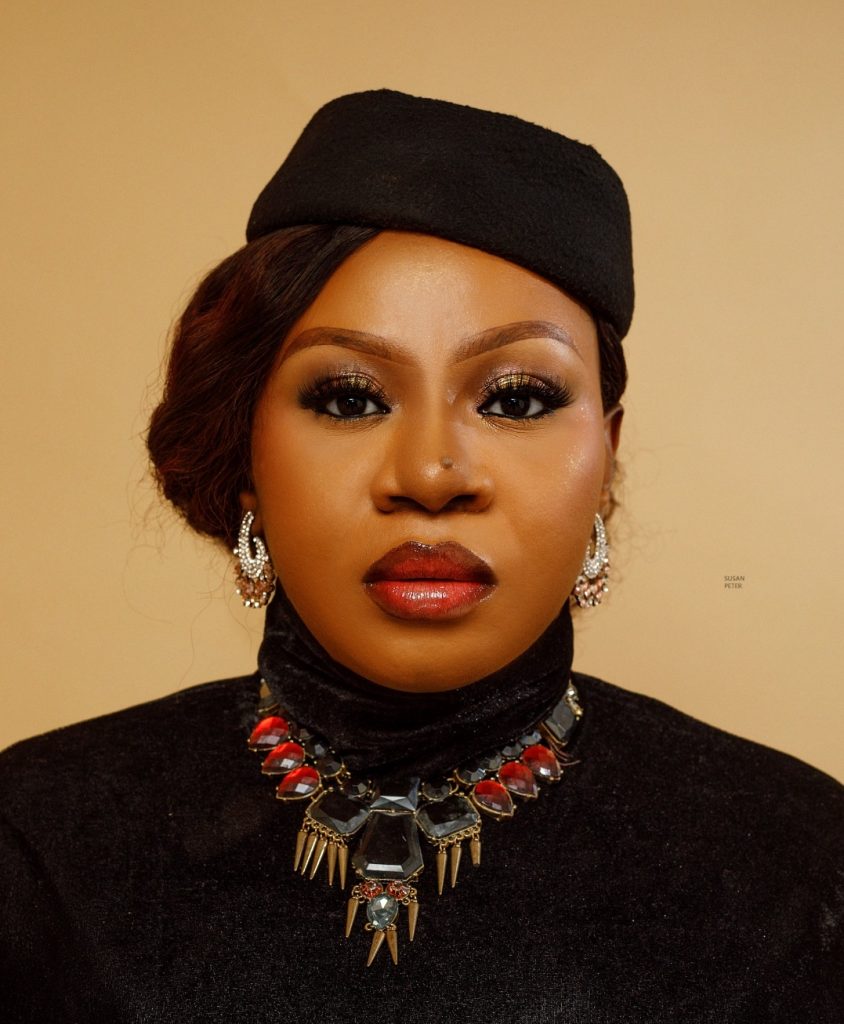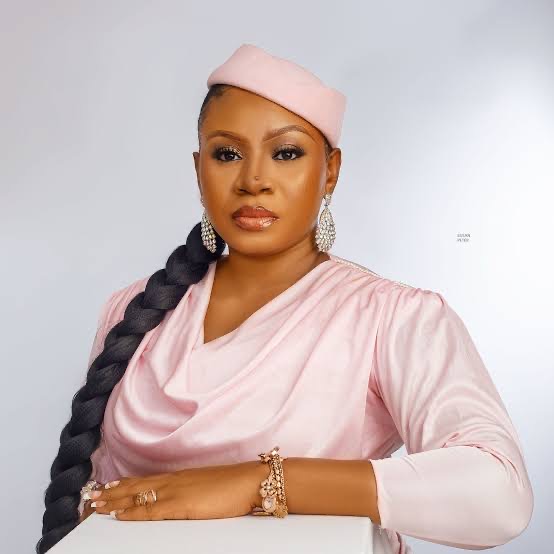Declaration serves as a testimonial, covering Ogboruche’s experiences both in her singing and in her personal life for the past 10 years…
By John Augustina
When it comes to communicating emotions and telling stories with songs, some Gospel artistes seem to always get it just right with their titles, lyrical composition, and sound every time they push out a project. Enkay Ogboruche’s new album, Declaration tells the story of a journey filled with gratitude. Declaration comes with 10 tracks, befitting for the testimonies evident in the life of Ogboruche in the last decade. The album was crafted to convey the narrative of God’s work.
Ogboruche is known for her hit track “Oh Lord I Dey Hail” in which she featured sensational American Gospel artiste, Kierra Sheard. The song fast became an anthem in many concerts and churches within and outside of Nigeria. After a few other singles, Ogboruche took to the stage officially in 2015 with her debut album, The Kingdom Anthem. The journey has clearly been a good one for her, and Declaration registers as her third album. Declaration is a mix of live performances and studio-recorded songs with the message of God’s faithfulness and blessings.
Ogboruche kick-starts Declaration on a good note with “The Best.” The song soars on smooth piano scales, chromatic percussion that dwindles between semitones from the electric guitar, intense kicks on the drums, and audible tremolo sounds from the bass guitar. Ogboruche describes Jesus as the best thing that has happened to her. In the line that says, “you are the best,” she explains how unhindered God’s love is, and how vested he is in loving and taking care of his children.
With the intro of “Delight,” you can tell you are about to go on a memorable, melodic journey with Ogboruche. The track starts with a loop, a simple sequence from the piano, and drum rolls to complement. This track is an emotionally-charged rendition that centers solely on how encompassing God’s love is. Here, Ogboruche calls herself “the delight of God.” She sings, and quite convincingly, too, about how God changed her story and made her worthy of his blessings.
(Read also: Okey Sokay’s The Archives Album Focuses More on Production than Sound Lyricism)
Accompanied by giant staccato beats from the jazz drums, crescendo piano chords, harmonies from the lead guitar, “Already Done” starts with popular Nigerian singer, Manus Akpanke, singing about the constant nature of God. Here, Ogboruche declares that all she wants is already done. The competition between her voice and the strident sounds from the instrument in this track cannot be neglected. Her voice keeps getting drowned as the song progressed. This apparent imbalance forced her to screech in order to be heard. This has been a common issue with live-recorded songs in many Gospel albums. It is either the guitar percussion is too loud or the piano scales are above the voices.

“Chioma” appears on Declaration with monotonous rhythm and lyrics that seem to be too long to fit into a single line of a song. The melodies seem recycled with elements of basic chord progression, which explains why the notes sound familiar. Well, this could be boring, still, drawing from the tapestry of existing chords to create new songs isn’t an offense.
There was a clear decline in the quality of lyrics and the overall style of this track compared to the preceding ones. Here, Ogboruche holds up the message of God’s blessings and his ability. If there’s anything I enjoyed in this track, it is the audible, brassy blasts of the trumpet from singer, Nathaniel Bassey.
“Mmuo Nso Bilie” is layered on a low registered instrumental that gets soulful with every rhythm. Ogboruche spontaneously adores God with names. She puts real emotion into the lyrics as she pours out her heart to God for an encounter. I could play this song a thousand times and not get enough of it. I could feel the sincerity in her contagious desire for an outpouring of the spirit of God.
“Good God” is a song of gratitude to God for his grace and blessings. The song kick-starts the voyage of Afrobeats on the album. The chorus that says “Mma mma imela Nnam, eshe, modupe babami” is an impressive combination of Igbo and Yoruba language. The neat transition in the voice parting of the backup singers added extra beauty to the track.
Ogboruche empties her heart and soul in thanksgiving in “Thank you, Lord.” The song starts with a simple unison before transcending into complex musical progressions, chants and harmonic swaps. The line that says, “my praise will never be enough” communicates the depth of gratitude that flows from Ogboruche’s heart.
(Read also: Moses Bliss’ More Than Music Album Showcases his Skills in Full Gear)
“Sure Way” is a pidgin-based rendition that speaks of the security that exists in God. The line, “na your way, sure way” communicates the trust Ogboruche has in God and how much she is ready to follow God’s way. The message of God’s grace is evident throughout this track.
Ogboruche cranks Declaration up to a high praise with “Chukwu Oma.” This track is a medley of refurbished songs. I don’t know how much people find old songs appealing, but this medley is definitely interesting. Ogboruche opens this rendition with praise chants, followed by beats that can command dance moves. Here, Ogboruche stakes the message of God’s greatness through praise. This track strips existing praise songs of their medals. “Chukwu Oma” is definitely Afrobeats at its best in a Gospel praise song.
Last is the shortest song on the album, “Jara.” This song speaks of the additional blessings that God bestows on believers. Ogboruche likens God’s blessings to the stars in the sky; numerous, uncountable. The track rides on midtempo Afrobeats rhythm.
In an interview with Sunday Scoop, Ogboruche expressed how God came through for her after she broke her back in the early part of this year. She revealed that the healing was a miracle, as the medical assistance she had didn’t help at all. Declaration serves as a testimonial, covering Ogboruche’s experiences both in her singing and in her personal life for the past 10 years.
(Read also: Dunsin Oyekan’s The Glory Experience Album Takes on Deep-spirited Worship)
In Declaration, Ogboruche makes indigenous music styles more delectable. Her Igbo slurs are delivered gorgeously. I find the tone and texture of her voice intriguing. Indigenous slurs or patterns of singing may be a turn-off to some, but listening to Declaration, I fell in love with these elements. Igbo renditions are known for how they reach the deepest parts of the soul, leaving the listener mesmerised. You don’t have to know the language to feel the depth of emotion from which the song is coming from. “Chukwu Oma” had me dancing tirelessly, even when I didn’t understand most of the Igbo she spoke in the track. The song does not in the least betray the emotion of nostalgia. The medley effortlessly took me on an exciting ride back to old songs. This and more is the magic you should expect from the album.
Declaration is a fine recap of Ogboruche’s life through songs. The album thrives on good sound production and relatable lyricism. The message of hope, blessings, God’s ability, grace and love are spelt out in sermonic verses. Apart from in “Already Done” when there was an imbalance between the sound and the voices, the instrumental in basically all the tracks came out well.

The rhythms in most of the songs are laced with so much predictability. Most of the notes sound familiar. This has become a challenge in Gospel music in recent years. Most songs sound alike, and in fact, singers chant and speak in what seem to be like tongues. Despite the stylistic borrowings, however, the Declaration album has an undeniable level of originality that can be ascribed to Ogboruche. The Igbo renditions thrive on gear-shifting tones that create a huge gap between them and conventional Igbo songs. They weren’t boring, and they definitely didn’t have the usual dirge-like or war-like riffs that traditional Igbo songs have.
Barring the opening duet between Ogboruche and Akpanke in “Already Done,” which did not do too well, one of the most impressive elements on Declaration is the creative intro that ushers in most of the songs. Declaration is, generally, a good album.
Lyricism – 2
Vocal production – 1
Sound Production – 1
Beat – 2
Rating – 6/10
John Augustina is a writer, a journalist, a singer, loves people and currently writes for Afrocritik. You can connect with her on Facebook @John Tina and Instagram @johntina_tina.




Hello afrocritik.com admin, You always provide great resources and references.